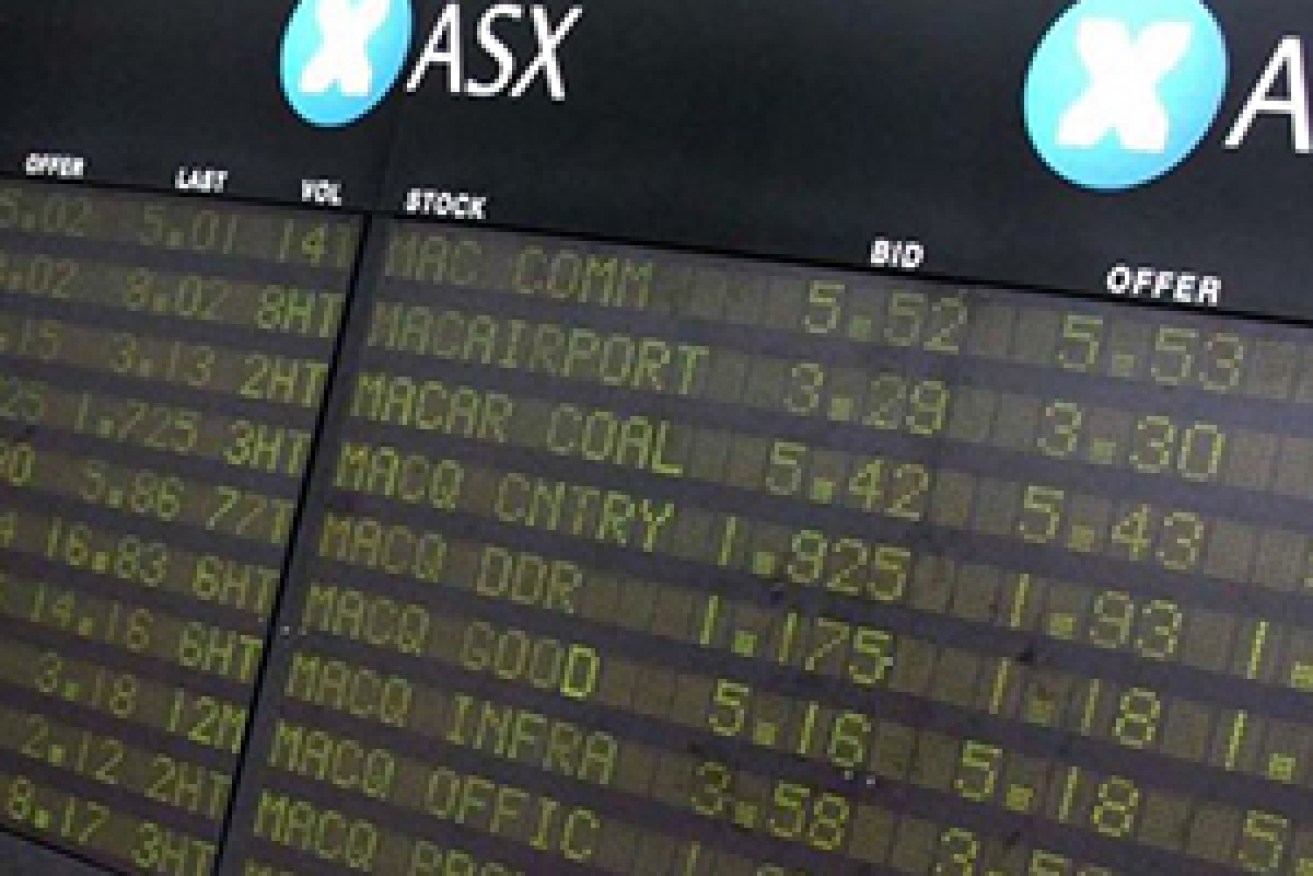Aussie shares lose $33b after second Chinese market slump

Australian shares shed more than $33 billion in value, after another slump on China’s mainland markets saw trading suspended for the second time this week.
Chinese stocks were halted after a further yuan devaluation spooked investors and sparked a 7-plus per cent sell-off in less than half-an-hour.
Chinese share trade was suspended by 12:43pm (AEDT), after less than 13 minutes of activity, when the key CSI 300 index of Shanghai and Shenzen stocks fell 5 per cent, triggering an automatic 15-minute trading halt.
• The tide’s falling for our biggest assets
• China stocks slump 7 per cent
• Shares struggle for second year
When the market reopened it only took a minute or two for the index to fall more than 7 per cent, triggering an automatic suspension of trade for the rest of today.
IG chief market strategist Chris Weston told the ABC’s PM program that showed the trading restrictions simply do not work.

Trade was suspended on Thursday as the market fell to 7 per cent. Photo: AAP
“Once that market hits 3.5 to 4 per cent everyone starts panicking in China and puts their sell orders in, and once that market comes out of that 15-minute window you see this rapid move straight into 7 per cent,” he said.
“The Chinese need to either do two things: They need to widen the gap between 5 and 7 per cent, otherwise this is going to happen every time; or they need to remove the circuit breaker and actually allow their market to fall to a level where the market sees value, which is a lot lower than where it is at the moment.”
Authorities allowed the yuan to weaken by around half-a-per-cent against the US dollar when the ‘fix’ was announced at 12:15pm, triggering the sell-off when share trading started at 12:30pm.
Analysts say the latest Chinese currency devaluation was bigger than expected, and raises fears that more money will flow out of Chinese investments.
“We saw probably the biggest weakening of the currency since August,” Mr Weston observed.
“It was down half-a-per-cent, significantly weaker than what I was thinking it was going to be based on overnight leads and overnight moves in other alternative currencies, that’s the issue.”

A devaluation of Chinese currency spooked investors. Photo: Getty
Chinese authorities are being forced to let the yuan’s value decline against the US dollar in order to boost a flagging Chinese economy by making its exporters more competitive and to facilitate interest rate cuts and other monetary stimulus.
However, Mr Weston warned that this could defeat European and Japanese efforts to revive their moribund economies, and pull down the rate of US growth, by exporting deflation around the world.
“If you believe that the price of goods is going to be cheaper in six months time, you’ll hold off from buying it,” he explained.
“Central banks hate deflation more than inflation, or rapid inflation, because it’s very hard to mitigate and change that consumer psyche.”
Deflation would also have the effect of pushing up the real repayment burden of debtors, at a time when households and governments in most Western economies are burdened with large debts.
Australian stocks shed $33 billion
The sudden slump had an immediate effect on Australian markets, which only got worse as the day went on.
The ASX 200 index closed 2.2 per cent lower at 5,010, having briefly dipped below the psychological 5,000-point mark during the session.
The All Ordinaries index finished down 109 points at 5,069, meaning Australian stocks lost about $33 billion of their market value today.
Bell Direct equities analyst Julia Lee has gone back through the data and cannot find a worse opening to a calendar year for Australian shares.

China’s market slump had an immediate effect on the Australian share market.
“It’s been the worst start since 1980, and I don’t have the daily figures before then, so it could be the worst start to the year that we’ve seen in Australian market history,” she told the ABC’s PM program.
Resources stocks, already heavily sold down in early trade, were battered after the latest Chinese moves.
BHP Billiton and Rio Tinto lost 4.8 per cent each, while smaller rival Fortescue slumped 5.6 per cent.
South32 dropped 7.6 per cent to 91 cents – that is its lowest closing price since being spun out of BHP Billiton in May, 2015.
Energy companies had also been bleeding heavily on Thursday, after crude oil lost more than 5 per cent overnight to reach its lowest level since 2004.
West Texas crude was selling for $US33.92 a barrel and Brent was worth $US33.12, having continued to fall during Asian trade.
Woodside was off 5.1 per cent to $27.06 and Santos slumped 7.4 per cent to $3.25.
The big four banks, which dominates Australia’s market capitalisation, also failed to hold their ground.
National Australia Bank slumped 3.3 per cent, while the Commonwealth got away with just a 2.1 per cent slide.
One of only 22 out of the top 200 companies to advance was Qantas, rising 1.2 per cent to $4.08 on cheaper fuel.
The Australian dollar was also hit hard, falling to 70.3 US cents by 5:33pm (AEDT).
– ABC








